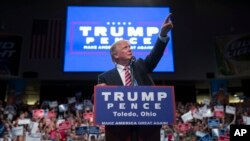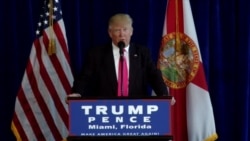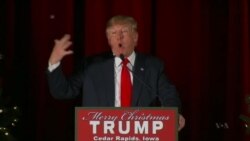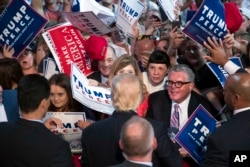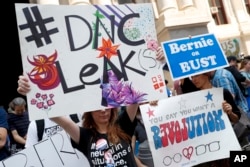U.S. Republican presidential candidate Donald Trump says he was being "sarcastic" when he encouraged Russia to hack into the email server of his Democratic opponent, Hillary Clinton, to find deleted emails from her years as secretary of state.
The Republican candidate stirred controversy Wednesday, telling reporters, "I will tell you this, Russia, if you're listening. I hope you're able to find the 30,000 emails that are missing. I think you will probably be rewarded mightily by our press."
He also said Moscow "probably" already has the emails Clinton considered to be private and deleted after serving as the top U.S. diplomat from 2009 to 2013.
But asked about those comments Thursday on Fox News, the real estate mogul seeking his first elected office said, "Of course I was being sarcastic."
"Frankly, they don't even know if it's Russia, if it's China, if it's someone else. Who knows who it is," Trump said.
Trump's comments come on top of concerns about the leak of nearly 20,000 emails hacked from Democratic National Committee headquarters in Washington and released by WikiLeaks prior to the Democratic Convention in Philadelphia.
The emails showed party officials favored Clinton's presidential nomination and tried to undermine the candidacy of her rival, Vermont Senator Bernie Sanders.
U.S. computer experts have said they believe Russian state actors are behind the hack, and some Democratic officials claim the timing of the leak suggests Russian President Vladimir Putin is trying to skew the U.S. election process in Trump's favor.
WATCH: What Trump Said
U.S. allies worrying
Still, U.S. National Intelligence Director James Clapper said Thursday it was too early to pin the blame on Moscow.
"I don't think we're quite ready to make a call on attribution," Clapper told an audience at the Aspen Security Forum in Colorado, though he said Russia was on the list of "usual suspects."
Russia has denied any responsibility.
The top U.S. intelligence official, while refusing to specifically address Trump's comments, also said that type of rhetoric was having an impact on America's partners and allies.
"I hear that from my counterparts, my intelligence and security colleagues in many other countries who take very, very seriously and study very, very closely what the political figures in this country say," Clapper said. "It is a worry to them."
"I tell them I appreciate them sharing their concerns and that's our process in the United States, and hopefully it will all come out right," he said.
The Clinton campaign quickly denounced Trump, calling it the "first time that a major presidential candidate has actively encouraged a foreign power to conduct espionage against a political opponent."
Classified briefings to begin
Despite concerns about Trump's statements and Clinton's handling of classified emails, both presidential candidates will soon begin to receive classified intelligence briefings.
"Nominees for president and vice president receive these classified briefings by virtue of their status as candidates, and do not require separate security clearances before the briefings," a U.S. intelligence official familiar with the matter told VOA on Wednesday. "Candidates are advised of the classified nature of the material."
The official also emphasized that the briefings for Trump and Clinton "will be provided on an even-handed, non-partisan basis."
Clinton has said she deleted the emails because they were private, and not related to government affairs, even as she turned over to government investigators another 30,000 emails connected to her State Department business.
The U.S. Federal Bureau of Investigation recently concluded that Clinton was "extremely careless" in her handling of classified information contained in the emails, but said no criminal charges were warranted. FBI officials also said it is possible that Russia or another foreign government might have hacked her unsecure email server and have copies of the deleted emails.
VOA Russian service reporter Danila Galperovich in Moscow contributed to this story.




